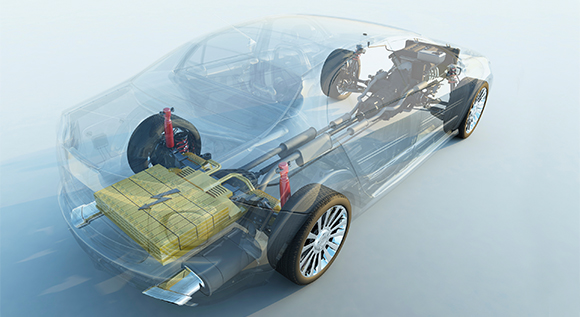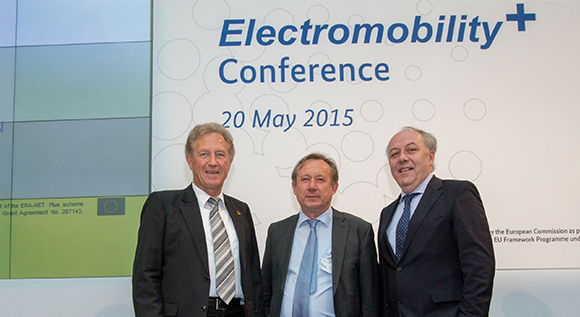Running on electricity
Climate-friendly transport: How the Federal Ministry for Economic Affairs and Energy is promoting electric mobility.
 © iStockphoto.com/ Firstsignal
© iStockphoto.com/ Firstsignal
Electric mobility is the key to sustainable and climate-friendly transport: vehicles are charged using green electricity and there are no carbon emissions. When it comes to electric vehicles, Germany is pointing the way into the future. It is not only proving itself to be a top location for research and technology, but is also strengthening its position as manufacturing base. This provides major opportunities for business and society, which is why Germany is striving to become the global leading supplier and lead market for electric mobility.
At the same time, electric mobility is one of the components which make up Germany’s Energy Transition – serving to link the growing share of electricity produced from the wind and the sun with developments in the transport sector. Ultimately, we need to reduce the level of greenhouse gases emitted by road vehicles so that we are able to meet our ambitious climate targets. Electric vehicles act as mobile batteries and are flexible in terms of when and how much electricity they take from the grid. This means that they can be used to stabilise the grid and can help improve its capacity utilisation – particularly at times when the level of renewable energy being fed into the grid fluctuates, depending on the weather conditions. Electric mobility therefore has the potential to become an important element in what is our increasingly complex energy supply system.
State Secretary Machnig: Networking with other European countries is the key to success
On 20 May 2015, the Federal Ministry for Economic Affairs and Energy joined with the Federal Ministry of Transport and Digital Infrastructure to host the European "Electromobility+" conference. The event brought scientists from different countries together with representatives from business and government to discuss a range of questions, such as: what core fields of action need to be addressed to enable electric vehicles to compete on markets right across Europe? What innovative products and procedures are needed to drive electric mobility forward? And what sustainable solutions are being explored here?
Developing networks between market players across Europe is crucial in order for us to move forward with electric mobility. This is something that was also underlined by State Secretary Matthias Machnig from the Ministry for Economic Affairs and Energy, who said: "When addressing the area of electric mobility, we need an approach that looks beyond national borders. Only by cooperating closely with other countries across Europe can we work to effectively implement this new technology and utilise the economic opportunities that electric mobility offers for Europe." A total of eleven EU Member States have taken part in the "Electromobility+" funding initiative since it was launched in 2010. The initiative has thus far spawned 18 cross-border projects (of which Germany has been involved in 16) which have been used to research ideas and innovations for the future – for the use of electric vehicles by craftspeople or carers travelling within the boundaries of a town or city or for modern, efficient battery technologies, for example.
Electric cars: "Refuelling" is quick and convenient
When the fuel gauge is pointing towards "empty", car drivers usually head for the nearest filling station. However, not every driver of an electric vehicle is used to being able to "fill up" at just any public recharging point - different sockets, long charging times, special access procedures requiring a customer card, and complex billing procedures often prevent this. That should now change: the Charging Station Ordinance is expected to enter into force before the end of the summer, stipulating uniform standards for sockets. Further to this, the Ministry for Economic Affairs and Energy is clarifying the law by defining the energy-related rights and obligations of operators of charging points so that there will be nothing to prevent all drivers of electric vehicles from using publicly accessible charging points. Also, fast charging can clearly speed up the time needed to recharge the battery. The "SLAM" (German acronym for "network of fast chargers for transport corridors and major cities") research project, which the Ministry for Economic Affairs and Energy is supporting with funding totalling nearly €9m, has sparked off the establishment of a needs-based public rapid charging infrastructure.
Improvements are also coming from a data-exchange system which brings together access and payment systems in the various charging points, known as "e-roaming". For this reason, in a process guided by the Ministry for Economic Affairs and Energy, the industry intends to conclude a cooperation agreement with various e-roaming providers in the near future, and at a later stage it is to be possible to use this in discussions with European partners about cross-border standards. "I am sure that, by pulling in the same direction, the private sector and the Member States will be able to arrive at good solutions for charging and billing the electricity used," said State Secretary Machnig at the "Electromobility+" conference.
On track to becoming a lead provider: Ministry for Economic Affairs and Energy offers funding programmes for fresh ideas
New products and services along the entire value chain can help Germany to maintain and build on its leading position in the global competition to deliver the new technologies. The funding programme "Electric mobility, positioning along the value chain II - ELECTRIC POWER II)" helps innovative companies to develop new business models relating to electric mobility. Here, it is important to tackle the major challenges and to find solutions for them: e.g. how electric vehicles can be integrated into the energy networks and the electricity market, how data security can be ensured in the charging and billing process, and how the manufacturing of the vehicles can be digitised. Funding is also going towards research and development of the propulsion technology and the use of electric mobility in the commercial vehicles sector.
In its National Action Plan on Energy Efficiency, the German government has decided to provide incentives for companies, government agencies and the administration to switch their car fleets to electric vehicles. The proposal is to provide special tax write-offs for commercially used cars (worth 50% of the purchase price) and to launch a "procurement campaign" designed to boost the proportion of electric vehicles in the car fleets of the Federal and State governments. If more electric vehicles are out on the roads, the new technology will become more visible in everyday life. Ultimately, this might encourage more private individuals to drive such a car themselves.
"Electric mobility: Strong on the market": conference on 15-16 June 2015
The German government is holding a national conference entitled "Electric mobility: Strong on the market" which will focus on what has already been achieved in the development of e-mobility in Germany, and what still needs to be done. The event will take place in Berlin on 15-16 June 2015, and will bring together experts from science, commerce, companies and associations, as well as from Federal and State governments and municipalities.
 State Secretary Matthias Machnig (BMWi), Wolfgang Burtscher (DG Research and Innovation, European Commission) and State Secretary Norbert Barthle (Federal Transport Ministry) (r. to l.) at the concluding event of the Electromobility+ funding initiative. © Federal Ministry of Transport and Digital Infrastructure (BMVI)zoom
State Secretary Matthias Machnig (BMWi), Wolfgang Burtscher (DG Research and Innovation, European Commission) and State Secretary Norbert Barthle (Federal Transport Ministry) (r. to l.) at the concluding event of the Electromobility+ funding initiative. © Federal Ministry of Transport and Digital Infrastructure (BMVI)zoom
